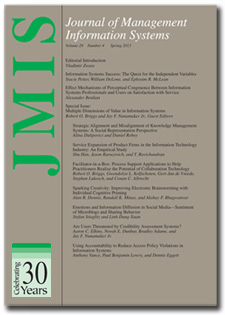Improving Phishing Reporting Using Security Gamification
IF 5.9
2区 管理学
Q1 COMPUTER SCIENCE, INFORMATION SYSTEMS
引用次数: 6
Abstract
ABSTRACT Phishing is an increasing threat that causes billions in losses and damage to productivity, trade secrets, and reputations each year. This work explores how security gamification techniques can improve phishing reporting. We contextualized the cognitive evaluation theory (CET) as a kernel theory and constructed a prototype phishing reporting system. With three experiments in a simulated work setting, we tested gamification elements of validation, attribution, incentives, and public presentation for improvements in experiential (e.g., motivation) and instrumental outcomes (e.g., hits and false positives) in phishing reporting. Our findings suggest public attribution with rewards and punishments best balance the competing necessities of accuracy with widespread reporting. Furthermore, our results demonstrate the unique benefits of security gamification to phishing reporting over and above other phishing mitigation techniques (e.g., training and warnings). However, we also noted that unintended consequences in false alarms might arise from shifts in motivation resulting from public display of incentives. These findings suggest that carefully calibrated external incentives (rather than intrinsic rewards) are most likely to improve the ancillary task of phishing reporting.使用安全游戏化改进网络钓鱼报告
摘要网络钓鱼是一种日益严重的威胁,每年造成数十亿美元的损失,损害生产力、商业机密和声誉。这项工作探讨了安全游戏化技术如何改进网络钓鱼报告。我们将认知评估理论(CET)作为核心理论,构建了一个原型网络钓鱼报告系统。在模拟工作环境中进行了三个实验,我们测试了验证、归因、激励和公开展示的游戏化元素,以改进钓鱼报告中的体验(如动机)和工具性结果(如点击和误报)。我们的研究结果表明,带有奖励和惩罚的公开归因在准确性与广泛报道的竞争必要性之间取得了最佳平衡。此外,我们的研究结果表明,与其他网络钓鱼缓解技术(如培训和警告)相比,网络钓鱼报告的安全游戏化具有独特的优势。然而,我们也注意到,虚假警报的意外后果可能源于公开展示激励措施导致的动机转变。这些发现表明,精心校准的外部激励(而不是内在奖励)最有可能改善钓鱼报告的辅助任务。
本文章由计算机程序翻译,如有差异,请以英文原文为准。
求助全文
约1分钟内获得全文
求助全文
来源期刊

Journal of Management Information Systems
工程技术-计算机:信息系统
CiteScore
10.20
自引率
13.00%
发文量
34
审稿时长
6 months
期刊介绍:
Journal of Management Information Systems is a widely recognized forum for the presentation of research that advances the practice and understanding of organizational information systems. It serves those investigating new modes of information delivery and the changing landscape of information policy making, as well as practitioners and executives managing the information resource.
 求助内容:
求助内容: 应助结果提醒方式:
应助结果提醒方式:


